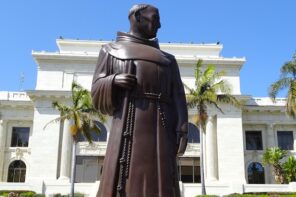In what long term lawyer advocate for clergy sex abuse victims Jeff Anderson calls a “David vs. Goliath” victory, the US Ninth Circuit Court of Appeals ruled on March 3, 2009 that a man who was sexually assaulted in the 1960s by a Catholic Servite order priest can pursue his civil suit for damages against the Holy See. In 2002, lawyers for the survivor (who remains anonymous) brought a civil suit against the Holy See (the governing entity of the Roman Catholic Church) for its role in authorizing multiple transfers of a priest they knew was abusing children.
The priest named in the suit, Fr. Andrew Ronan, deceased, was accused of sexual abuse in Ireland and then transferred to Chicago where he admitted to abusing three boys and was then transferred to Portland Oregon where he allegedly committed further abuse.
The Vatican vigorously challenged the right of the survivor to sue the Holy See claiming that it was exempt from such suits under the Foreign Sovereignty Immunity Act (FSIA.) The three judge federal appeals panel is the second US appeals court to rule that sexual abuse survivors can sue the Vatican. The Sixth Circuit Appeals Court in a Louisville Kentucky class action suit issued a similar, but more narrow, ruling three months ago.
Marci Hamilton, professor of constitutional law at Cardozo University and one of the lawyers in the Ninth Circuit case noted that the Ninth Circuit ruling offered survivors two grounds on which to bring suits. First, under the FSIA exception for tort action, they can sue the Vatican as the employer of priests and bishops. Second, under the “commercial act exception we can bring claims involving misrepresentation and fraud, vital claims because in many abuse cases there have been misleading claims made about the safety of their priests.”
Lawyers for the survivor expect to proceed to discovery which in this case will mean seeking to review Vatican files and depose high level Vatican officials including Pope Benedict who has intimate knowledge of these cases based on his prior position in the Vatican. They expect the Vatican to immediately seek a review of the decision by the full Ninth Circuit panel and to take the case to the Supreme Court if necessary.
The importance of the issue of Vatican accountability to national law is a key issue for advocates of church state separation and a matter of justice in numerous cases. Jonathan Levy, a DC lawyer who represents concentration camp survivors in a suit against varied parties including the Vatican Bank noted that the ruling in the Sixth Circuit “opens the door to other claims against the Catholic church.”
The dual and privileged status of the Vatican as both state and religion is little known by Americans. It was in fact only during the Reagan administration that the US finally granted the Vatican diplomatic recognition and exchanged ambassadors. In the UN, the Vatican is the only religion that holds non member state permanent observer status. In the US and in other countries where the Vatican has diplomatic immunity it has been used to protect the Vatican against law suits that would allow victims of injustice to seek compensation and to hide Vatican and diocesan records from judicial review. In the UN the Vatican’s special status has often stalled international progress and consensus on issues like condoms to prevent the transmission of AIDS, international family planning assistance and even the prosecution of rape and enforced pregnancy as international crimes.
The recently announced Circuit Court decisions are not only good news for groups like SNAP (Survivors Network of Those Abused by Priests) but for advocates of separation of church and state. Hopefully they signal a shift in the judicial system away from excessive deference to religious claims of exemption from the law.




